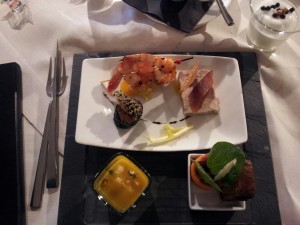Storytelling v. narration (and a translation conundrum)

Inspiration food @UnDimancheAParis
One of the (many) interesting points that came up today during Ideas On Stage’s Presentation Zen Studio — and merit further discussion — is the difference between storytelling and narration.
It flitted by. I wanted to grab hold of it and chew on it for a while, but as is often the case with short intensive sessions, tantalizing nuggets just kept flying through the room. I’d barely jotted something down that we were five or more ideas down the highway.
It seems many use the two terms interchangeably. Doing so solves a recurring dilemma when wanting to talk about storytelling in French, where options are few and hardly satisfying:
- Storytelling as “raconter une histoire” sounds terribly dull, not to say wimpy.
- Committing an impair by using the Anglo word is oft frowned upon when there are linguistic purists in the audience.
- Storytelling as narration (the word is the same in French) solves the problem. But leads to a dilemma if in fact the two are not the same thing.
For many, a story is a sequence of events — Act I, II and III (or more) — that lead to an outcome and require one or more characters (protagonist, antagonist, etc.), a challenge/problem/conflict, and show how the protagonist overcomes that tension (and hopefully prevails). Yeah, OK, I’m simplifying, but you get the idea.
But is that a narration?
Mike Bonifer, over at the Gamechangers team, offers a useful distinction:
Narrative: a flow of events connected to a theme. A story: the conscious ordering of these events to elicit meaning.
Aram Zucker-Scharff defines a narrative as:
The method and means by which you construct the events of a story into a plot. It concerns itself with the sequence of the events, the medium on which they are told and the way these events are put together into one coherent unit.
Could we say, if striving for simplicity, that if a story is the WHAT, the narration is the HOW?
But that doesn’t solve my cunundrum in French, does it…
Wordreference and Termium offer “narration” as translation for storytelling.
The French Commission générale de terminologie et de néologie (which the GDT cites) offers “la mise en récit”. That seems more specific and appropriate, but still lacks zing.
Would anyone like to offer a suggestion on how they differentiate between storytelling and narration and how they would express that distinction in French?
Tags: narration, presentation skills, siteEN, storytelling





Pleasure to meet you yesterday. I would agree that there IS a difference. For me, the importance and skill of our role is in changing the “what” into the “so what” for the audience.
Hello Patricia
Thanks for the opportunity to debate !
Two ideas came to my mind :
a. we could revive the lovely word of “conte” (tale) for after all storytelling is much like spinning tales, innit ?
b. we could go Hollywood on this and call storytelling a “scénarisation”. That would be quite in keeping with what Christian Salmon describes in his book and the marketing/advertising practice.
What do you think ?
Hi Claire! Thanks for chiming in, it’s nice to see you 🙂
@PierreMorsa, of Ideas on Stage, dropped me an email after reading my post, and they have the same problem. He tends to use story/storytelling in French and sometimes, reluctantly, “histoire”. I do feel that clarity of communication trumps linguistic purity, though I’m sure some would disagree with me.
Thank you for your suggestions, debate is good. For me, though, they don’t quite fit. Conte (FR) or tale (EN) are usually fictional, imaginary and aim to entertain – and that’s not the meaning of storytelling as used at least in this context. Scénarisation points to the process of writing or developing a script, which again is part of constructing a compelling story but isn’t the story or the storytelling.
Not easy, is it, sometimes, to find just the right equivalents in another culture or language?
What about “mise en scène narrative”? A bit wordy maybe? Like most people I guess, I tend to use “storytelling”.
“Ca me parle.” Yet I wonder if I’d ever use the expression; Loi Toubon not withstanding, crispness and specificity are big motivations for using an English word sometimes!